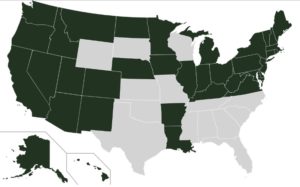By Lindsay Street, Statehouse correspondent | Nearly one in 10 older and poor S.C. residents who died in the last five years could be alive today had they had access to care, a new study found.

After reviewing the federal study, Christian Soura, who served as the state’s former Medicaid program head, this week told Statehouse Report that “several hundred” people likely died because the state did not expand Medicaid.
Soura, who is now vice president of policy and finance at S.C. Hospital Association, said the study noted “health care amenable” causes of death — causes that are largely preventable with access to care — among aging and low-income people in states without expanded Medicaid.
“This study reaffirms what hospitals already knew: access to coverage means access to care,” Soura said. “This study is another study that falls in line with the last several years of research, which is that Medicaid expansion keeps people alive and keeps people healthier.”
Report finds 15,600 preventable deaths nationwide
A working paper from the National Bureau of Economic Research found that, nationwide, 15,600 deaths could have been prevented if all states had adopted Medicaid expansion in 2014. Among individuals ages 55 to 64 in households earning less than 138 percent of the poverty level (such as a four-person household making less than $25,100 per year), there was a 9.3 percent reduction in death rates for states that expanded Medicaid.
State-specific data is not available because, according to a report author, the numbers haven’t been teased out state-by-state.
“I would like to provide state level estimates in the future (since I have had many requests for them) but will probably not have a chance to until some time next week,” University of Michigan assistant professor Sarah Miller told Statehouse Report on Wednesday.
South Carolina low-income earner advocate Sue Berkowitz said many of the deaths likely came from the state.

“It’s absolutely not surprising to see people are dying for things if they had preventive medicine and got the care up front they could not only avoid death but probably live more productive lives,” the director for S.C. Appleseed Legal Justice Center said.
Released this month, the paper is a large-scale federal survey of data linked to administrative death records.
In states that first adopt Medicaid expansion, the survey found a first-year decline in annual mortality among those older and poor of 6.4 percent, but it grows year over year to nearly one in 10 fewer deaths. In the entire population, the death rate in states with expanded Medicaid is 0.13 percent lower.
“This highlights an ongoing cost to non-adoption that should be relevant to both state policymakers and their constituents,” the report states.
Two governors promised to veto expansion
South Carolina is one of 14 states that has not adopted the largely federally funded Medicaid expansion provided by the 2010 Affordable Care Act (ACA) — a move directed by two successive Republican governors, both of whom promised vetoes.
In a 2018 Statehouse Report story, a governor’s office spokesman reiterated Gov. Henry McMaster’s position:

“Under no circumstances will Governor McMaster approve of expanding Medicaid in South Carolina.” The office did not respond to a request for an updated comment for this story.
Democratic lawmakers have put forward doomed measures over the years, but they have been unable to sway the Republican-controlled legislature. A House bill filed this year sought to bring the question of expansion to a voter referendum. It has stalled in committee.
“We have a moral obligation to our citizens to, first and foremost, not to allow people to die because of political reasons,” House Minority Leader Todd Rutherford of Richland said.
The status of Medicaid in S.C.
After a 2012 Supreme Court ruling that allowed states to reject expansion, Republican Gov. Nikki Haley declared the state would not expand Medicaid on her watch. McMaster has followed in her footsteps.
- A 2018 report found that if South Carolina expanded Medicaid, its uninsured population would drop from 660,000 to 466,000. Read more.
While the federal share of Medicaid has typically averaged about 57 percent nationwide, under the ACA, states will be reimbursed 90 percent in 2020. When the expansion first started, the federal government picked up 100 percent of the tab but that has been declining since. However, it is expected to remain at 90 percent, according to government documents.
But, in its own way, South Carolina has expanded Medicaid’s reach and plans to do more.
A Post and Courier analysis from earlier this year, found that the state has seen a 32 percent budget increase to Medicaid in the last eight years, with enrollment growing by more than 260,000 people.
Over the past year, the state also has sought a federal waiver that would allow it to impose work requirements on Medicaid beneficiaries. It was formally submitted this June (see document here). Some have warned that, should it be approved, thousands could lose vital benefits.
But more people could gain coverage. The waiver includes two provisions that coverage to low-income people without “expanding Medicaid.” The first would expand eligibility for the Children’s Health Insurance Program, and the second would expand coverage for low-income women beyond pregnancy until the child’s first birthday.
“Political leaders in this state are taking a look at the populations who need help the most and trying to connect those people to some form of coverage,” Soura said. But, he added, “it’s clear there is more we could do to reduce the uninsured rate and more we could do to reduce rates of mortality of low income older adults.”
More states adopting expansion

Eleven states that initially balked at Medicaid expansion have since increased their Medicaid recipients, bringing the total to 36 states, according to Kaiser Family Foundation.
“If you look back over the last several years the number of states that do Medicaid expansion has continued to increase,” Soura said. “There’s evidence in South Carolina and the remaining non-expansion states that people on both sides of the aisle are looking at what can be done.”
Berkowitz said expanding Medicaid has support in the state and in the legislature, but it is quashed by McMaster and other Republican leaders.
Leading House and Senate Republicans did not return requests for comments on the impacts of not expanding Medicaid.
“Democrats have tried everything we can to try to make it happen,” Rutherford said. “We don’t understand what the opposition is relying on at this point to continue to oppose it.”
- Have a comment? Send to: feedback@statehousereport.com



As a social worker for this state I have to admit that the state houses view on poverty in S.C. is indeed warped. currently under Trump almost every person whom can work is working in this state and most are simply the working poor and they need a break !
Since Haley’s governorship, I personally have lost over 55 individuals on my case load whom otherwise might be productive today had Medicaid been accepted by those in Columbia. I am one social worker, we all have the same story!
This is an appalling story about preventable deaths in SC. It is equally appalling to look at the map and see the states that have not implemented Medicaid expansion as all the Deep South states, Texas and others where racial prejudice and a history of resisting expansion of rights and services to the poor prevail. I hope the families of those who died during the past five years as a result of lack of access to care will vote for political change. Judy Hines of Charleston
I cannot understand why this majority Christian state will not expand Medicaid. We should be caring for our sick and poor.
I come from a family that includes a lot of blue collar workers.
What happens is around age 50, you become sick. Your illness affects your work, you lose your job, you lose your health insurance. Or maybe you never made enough and didn’t have insurance in the first place. Coverage is not required if you fall below a certain income level, even though you worked full time.
Now you’re uninsured, and getting sicker. You try to go to a doctor, no one will see you without coverage. You apply for disability (after all, you can’t work). You can’t be considered for disability because you don’t have medical findings from doctors you can’t afford. You’re getting sicker.
You go to the emergency room because you are regularly vomiting blood now, and in pain. They see you, but you still have enough blood in your body that this is not considered an EMERGENT issue. They acknowledge that you certainly have some sort of problem, but they can’t help you, you don’t have insurance, you need to follow up with a primary care doctor.
They refer you to a low income clinic. You call, the waiting list is three months long, but better than nothing. You make the appointment and hope for the best.
You are getting sicker ! Now there is blood leaving your body from both ends, and you are ALWAYS in pain. Your return to an urgent care, but no testing or imaging can be done without insurance, so you’re sent back home with another referral for the same clinic…
I wish this story had a happy ending. I’ve seen people finally diagnosed with terminal cancer after moving out of state, where coverage was available. One turned out to have a neurological condition. One turned out to have a staph infection.
These are not people that never worked, didn’t want to work, or were looking for a handout. These are people with families, jobs, responsibilities. Worked and paid taxes all their lives. Access to medical care could have changed everything.
The worst part of it is being in a medical facility, surrounded by lifesaving equipment, educated and trained professionals around you and being told no.
No.
We will not help you.
No.
You’re in a desert, you finally found an oasis, but they won’t give you a drink. You’re sent back into the desert, alone. With an automated telephone number to call.
Its the horrible, personal understanding that your life does not matter. That no one cares. Policies and politics are far, far more important.
Its exclusionary to the worst degree. Were you ever the five year old on the other side of the glass, watching the other kids play, and longing to be able to join ? Its like that, intensified.
It just sickens me to hear people talk about it like its someone else’s issue. Or like the people who would benefit from Medicaid expansion are lazy or bad. Its your neighbor, the guy you work with, a parent at the cub scout meeting, grandpa.
Your body will betray you at some point. It happens to everyone. Everyone. We will all die, maybe a sickness, maybe an accident. Would you not want to be able to access care if you were in that position ?
How does a primarily Christian state not address this? The heathens and Democrats are doing a far better job of caring for their sick and poor. Its a damn shame.
Pingback: NEW for 8/21: Medicaid enrollment rises; Postal con job – Statehouse Report – Impact investing